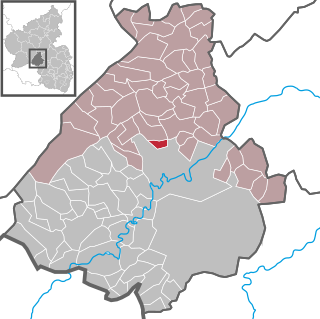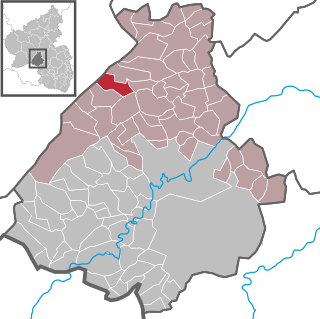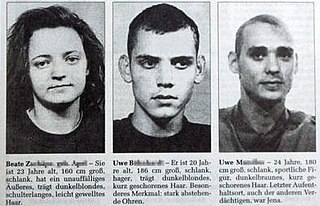
Idar-Oberstein is a town in the Birkenfeld district in Rhineland-Palatinate, Germany. As a Große kreisangehörige Stadt, it assumes some of the responsibilities that for smaller municipalities in the district are assumed by the district administration. Today's town of Idar-Oberstein is the product of two rounds of administrative reform, one in 1933 and the other in 1969, which saw many municipalities amalgamated into one. The various Stadtteile have, however, retained their original identities, which, aside from the somewhat more urban character encountered in Idar and Oberstein, tend to hearken back to each centre's history as a rural village. Idar-Oberstein is known as a gemstone town, and also as a garrison town. It is also the largest town in the Hunsrück.

Vollmersbach is an Ortsgemeinde – a municipality belonging to a Verbandsgemeinde, a kind of collective municipality – in the Birkenfeld district in Rhineland-Palatinate, Germany. It belongs to the Verbandsgemeinde Herrstein-Rhaunen, whose seat is in Herrstein.

Schauren is an Ortsgemeinde – a municipality belonging to a Verbandsgemeinde, a kind of collective municipality – in the Birkenfeld district in Rhineland-Palatinate, Germany. It belongs to the Verbandsgemeinde Herrstein-Rhaunen, whose seat is in Herrstein.

The Solingen arson attack was one of the most severe instances of xenophobic violence in modern Germany. On the night of 28–29 May 1993, four young German men belonging to the far right skinhead scene, with neo-Nazi ties, set fire to the house of a large Turkish family in Solingen in North Rhine-Westphalia, Germany. Three girls and two women died; fourteen other family members, including several children, were injured, some of them severely. The attack led to violent protests by Turkish diaspora members in several German cities and to large demonstrations of other Germans expressing solidarity with the Turkish victims. In October 1995, the perpetrators were convicted of arson and murder and given prison sentences between 10 and 15 years. The convictions were upheld on appeal.

Marwa Ali El-Sherbini, was an Egyptian woman and German resident who was killed in 2009 during an appeal hearing at a court of law in Dresden, Germany, when she was three months pregnant. She was stabbed by Alex Wiens, an ethnic German immigrant from Russia against whom she had testified in a criminal case for verbal abuse. El-Sherbini's husband, who was present at the hearing, tried to intervene. He too was repeatedly stabbed by Wiens and was then mistakenly shot and wounded by a police officer who was called to the court room. Wiens was arrested at the crime scene and subsequently tried for murder and attempted murder. He was found guilty of both charges; it was also found that Wiens's actions constituted a heinous crime, because they were committed in front of a child, against two people, in a court of law, and fulfilled the murder criterion of treacherousness, such as hatred against foreigners. Wiens was sentenced to life imprisonment.

The 2011 Frankfurt Airport shooting occurred on 2 March 2011 at Frankfurt Airport in Germany. The shooter, Arid Uka, was arrested and charged with killing two United States Airmen and seriously wounding two others. He was convicted of murder and attempted murder and sentenced to life in prison on 10 February 2012.

The National Socialist Underground murders were a series of racist murders by the German Neo-Nazi terrorist group National Socialist Underground. The NSU perpetrated the attacks between 2000 and 2007 throughout Germany, leaving ten people dead and one wounded. The primary targets were ethnic Turks and ethnic Kurds, though the victims also included one ethnic Greek and one ethnic German policewoman.

The National Socialist Underground, or NSU, was a far-right German neo-Nazi terrorist group which was uncovered in November 2011. The NSU is mostly associated with Uwe Mundlos, Uwe Böhnhardt and Beate Zschäpe, who lived together under false identities. Between 100 and 150 further associates were identified who supported the core trio in their decade-long underground life and provided them with money, false identities and weapons. Unlike other terror groups, the NSU had not claimed responsibility for their actions. The group's existence was discovered only after the deaths of Böhnhardt and Mundlos, and the subsequent arrest of Zschäpe.

On 22 July 2016, there was a mass shooting in the vicinity of the Olympia shopping mall in the Moosach district of Munich, Germany. An 18-year-old Iranian-German, David Sonboly, opened fire on fellow teenagers at a McDonald's restaurant before shooting at bystanders in the street outside and then in the mall itself. Nine people were killed and thirty-six others were injured, four of them by gunfire. Sonboly then hid nearby for more than two hours, and killed himself by a self-inflicted gunshot wound when confronted by police.

The 2016 Hamburg stabbing attack, also referred to as Murder at the Alster or Alster Murder, was an attack on 16 October 2016 in the city of Hamburg, Germany. A 23- to 25-year-old man "of southern appearance" was named as the suspect. On 30 October 2016, the Islamic State (IS) claimed responsibility for the attack, though police later said a terrorist background or motive for the attack was "unlikely".

Maria Ladenburger was a 19-year-old medical student from Freiburg im Breisgau, Baden-Württemberg, Germany, who was found raped and drowned on 16 October 2016 in the river Dreisam. On 3 December 2016, Freiburg police arrested Hussein Khavari, who had been identified by a hair found at the crime scene, and a CCTV recording from inside a tram. DNA evidence linked him to the crime scene and he was ultimately convicted.

The Atomwaffen Division, also known as the National Socialist Resistance Front is an international right-wing extremist and neo-Nazi terrorist network. Formed in 2013 and based in the Southern United States, it has since expanded across the United States and into the United Kingdom, Canada, Germany, the Baltic states, and other European countries. The group is described as a part of the alt-right by some journalists, but it rejects the label and it is considered extreme even within that movement. It is listed as a hate group by the Southern Poverty Law Center (SPLC), and it is also designated as a terrorist group by multiple governments, including the United Kingdom and Canada.

The 2018 Chemnitz protests took place in Chemnitz, in the German state of Saxony. In the early morning of 26 August, after a festival celebrating the city's founding, a fight broke out resulting in the death of a German man and serious injuries to two other people. Two Kurdish immigrants, one from Iraq and the other from Syria, were named as suspects. The incident reignited the tensions surrounding immigration to Germany, which had been ongoing since 2015, and the European migrant crisis. In response, mass protests against immigration were ignited by far-right groups. The protests spawned riots and were followed by counter-demonstrations.
On 13 October 2018, an 18-year-old woman was raped outside a discotheque in Freiburg, Germany by a series of men. In July 2020, eight perpetrators were convicted of rape, while two additional men were convicted for not aiding the victim. The case drew public attention, due in part to the refugee status of most of the perpetrators.

Thomas Haldenwang is a German lawyer and the president of the German Federal Office for the Protection of the Constitution.

Rezo is a German YouTuber who in 2019 ignited a fiery political debate with his video "Die Zerstörung der CDU". In it, he heavily criticized the then ruling grand coalition in Germany, especially the coalition leading party CDU.

The Halle synagogue shooting occurred on 9 October 2019 in Halle, Saxony-Anhalt, Germany, and continued in nearby Landsberg. After unsuccessfully trying to enter the synagogue in Halle during the Jewish holiday of Yom Kippur, the attacker, later identified as 27-year-old Stephan Balliet, fatally shot two people nearby and later injured two others.

The Hanau shootings occurred on 19 February 2020, when eleven people were killed and five others wounded in a terrorist shooting spree by a schizophrenic far-right extremist targeting two shisha bars in Hanau, near Frankfurt, Hesse, Germany. After the attacks, the gunman returned to his apartment, where he killed his mother and then committed suicide. The massacre was called an act of terrorism by the German Minister of Internal Affairs.

The COVID-19 pandemic in Germany has resulted in 35,383,015 confirmed cases of COVID-19 and 152,997 deaths.
In Rhineland-Palatinate, Germany, two police officers were fatally shot at a traffic stop on 31 January 2022. The Public prosecutor's office believes that the two arrested suspects were attempting to cover up their poaching.



















